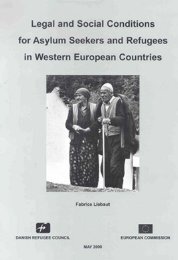I External aid
I External aid
I External aid
You also want an ePaper? Increase the reach of your titles
YUMPU automatically turns print PDFs into web optimized ePapers that Google loves.
ANNUAL REPORT ON THE IMPLEMENTATION OF THE EUROPEAN COMMISSION’S EXTERNAL ASSISTANCE<br />
SMEs. As a result, 1200 new jobs were created in return<br />
areas throughout Bosnia and Herzegovina.<br />
The European Commission’s approach to encouraging economic<br />
development in this country focuses on the following:<br />
◗ creating a single market between Bosnia’s entities, in line<br />
with EU standards and institutions;<br />
◗ supporting structural reforms to prepare for the<br />
transition to a market economy;<br />
◗ stimulating the development of the private sector,<br />
especially SMEs;<br />
◗ ensuring that both local economic development and refugee<br />
returns are sustainable.<br />
Agriculture, forestry, and the environment<br />
The EC has helped the veterinary services of both Bosnia and<br />
Herzegovina to work together to ensure better health and<br />
management of livestock, which will increase consumer<br />
confidence and trade.<br />
BiH potentially possesses one of Europe’s largest natural<br />
forest covers, but some of these ‘forest lands’ are currently<br />
bare and threatened by desertification, as well as by unexploded<br />
mines. With EC <strong>aid</strong>, 1350 hectares have been reforested<br />
(750 hectares directly funded by the EC, the rest<br />
financed bilaterally by Italy).<br />
In the aftermath of the war, the protection of BiH’s abundant<br />
natural resources has fallen even lower on the political<br />
agenda. With EC encouragement, a set of new environmental<br />
protection laws was drafted and is now being discussed with<br />
all interested parties.<br />
3. Croatia<br />
Parliamentary and presidential elections in January 2000<br />
resulted in a change of government in Croatia and brought a<br />
dramatic change in the political climate. These changes have<br />
offered the opportunity for rapid progress in the relationship<br />
between Croatia and the EU. The EU responded swiftly<br />
with an immediate increase in contacts between the EU and<br />
Croatia; the status of the European Commission’s office was<br />
upgraded to a Delegation, and the EU agreed in November<br />
2000, to open negotiations with Croatia for a Stabilisation<br />
and Association Agreement.<br />
The main priorities for EC <strong>aid</strong> in Croatia are ethnic reconciliation<br />
and the return of refugees, support for democratic principles<br />
and the Stabilisation and Association process, which<br />
has already been negotiated.<br />
© European Commission<br />
REBUILDING NATIONAL INFRASTRUCTURE IN BOSNIA<br />
AND HERZEGOVINA<br />
The public utilities are now up and running. Many major<br />
EU-funded countrywide reconstruction projects were completed<br />
during 2000. Water and electricity networks were<br />
repaired, bridges rebuilt, mines were cleared, kilometres<br />
of roads rehabilitated, hospitals rebuilt and equipped,<br />
schools, kindergartens and universities reopened and telephone<br />
lines restored. Sarajevo airport was substantially<br />
upgraded, following similar improvements made in previous<br />
years to the airports at Mostar and Banga Luka.<br />
Mostar and Sarajevo: The extensive war damage inflicted<br />
on these two cities required several integrated reconstruction<br />
programmes. The results are already visible with new<br />
houses, public buildings, and restored networks for water,<br />
energy and transport.<br />
Reconstructing Bosnia and Herzegovina: The war inflicted<br />
substantial damage to Bosnia’s physical links to the rest of<br />
Europe. The EC has funded the repair and rebuilding of<br />
many bridges, including the bridges across the Sava at<br />
Gradiska, Benska and Brcko.<br />
€10 million of the total €18.54 million budget for 2000 was<br />
set aside for the return refugee. The Croatian authorities were<br />
given another €3 million for technical assistance to help carry<br />
out vital reforms in key sectors such as: European integration,<br />
justice, public administration reform, SMEs, statistics and<br />
regional development. A further €2.34 million was provided<br />
for promoting SME and craft businesses. The €18.54 million<br />
total also includes €1.5 million support for the TEMPUS<br />
inter-university co-operation programme given by PHARE<br />
in 2000. An additional €1.5 million was given for technical<br />
and administrative assistance to support programme implementation.<br />
The Balkans<br />
The outcome of<br />
Croatia’s January<br />
2000 elections<br />
has significantly<br />
improved<br />
its relationship<br />
with the EU.<br />
49

















